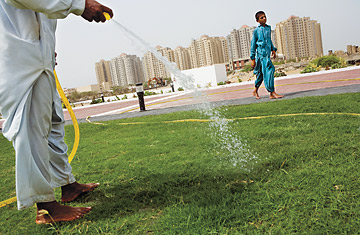
Access to the city's water is the key to new developments like Creek City in Karachi
What mayor these days doesn't want his city to be world class? The allure of miraculous transformation writ large across a massive cityscape is today's urban alchemy. Syed Mustafa Kamal, 36, is no exception. The mayor of Karachi, Pakistan's sprawling metropolis by the sea, has sworn that his city will rival Dubai in five years.
He's made some progress. He's building a 47-story IT tower with a 10,000-seat call center, one of the biggest in Asia. And the city has completed six over- and under-passes to ease congestion, along with a signal-free crosstown corridor. But he still has a long way to go. More than half the population of 16 million (give or take a few million) lives in ramshackle squatter settlements. Power outages are common. Only about half the city's daily water needs are met. Crime, congestion and political volatility have plagued this ancient port for decades. Unhappily, terrorism is making inroads. On July 7, six bombs detonated across the city in succession, spreading panic and instability. On Oct. 19, 2007, a suicide bombing at the homecoming rally for former Prime Minister Benazir Bhutto killed 141 in the worst terrorist attack in Pakistan's history. Kamal, who wears the goatee and well-cut suit of the IT professional he once was, waves these issues away as if they were minor details. "It can be done. It will be done,"he says. "In five years time, I can turn this city around."
There is only one caveat. He doesn't control the city. No one does — at least not all of it — and it's a problem that is not Karachi's alone. As big cities expand into mega-cities, city governments don't necessarily go along for the ride. That makes governance a chore and development a nightmare. Karachi is made up of 18 towns and six cantonments — legacies of a military system that awards high-ranking officials with prime allotments of land. A local board runs each cantonment. It charges fees and sets plans. It builds roads, digs sewers and erects traffic lights. It organizes maintenance and garbage collection.
And none of them are answerable to the city government. It's kind of like a condominium board made up of former Marines taking over an entire city block. "You can't even run a house when you have more than one owner, so how can you operate a city with so many different bosses?"asks Kamal. As it turns out, not easily.
Every year Karachi is inundated by the monsoon rains of late summer. Last year floods paralyzed the city for more than two weeks; workers navigated the streets in small boats as if the city were an Asian Venice. Twenty-eight people died — some drowned, and some were electrocuted when live wires hit the water.
Kamal has spent $2.6 million in the past year excavating and renovating the city's fetid wastewater canals. But the work had to stop at the cantonment lines. Some of the cantonment boards worked with the mayor. Others revamped only parts of their cantonment, leaving out the impoverished areas. And at least two of the cantonments have filled in drainage canals in order to build new luxury developments. That may help with Kamal's Dubai scheme, but those upstream will suffer. And Kamal will get the blame. "When everything goes right, no one thanks me," he complains. "But when there are problems, even if they are in the cantonments and I have no jurisdiction, they come to me to complain."